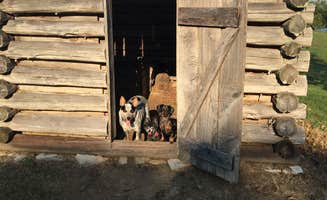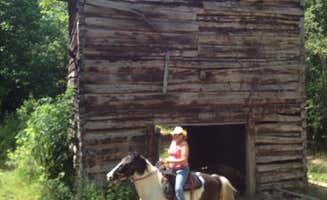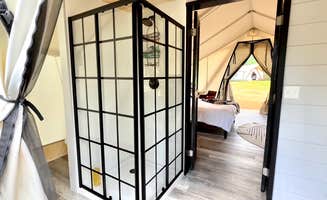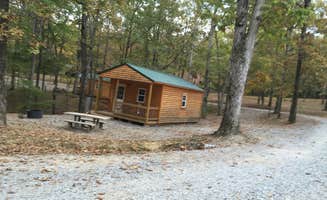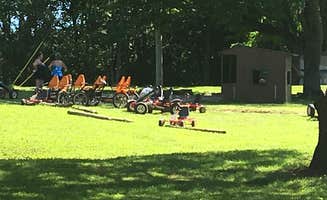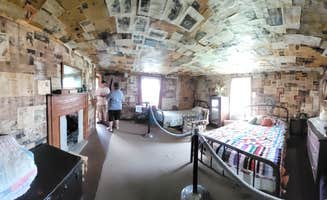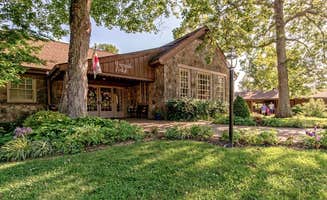Dispersed camping opportunities abound in the Land Between The Lakes (LBL) National Recreation Area near New Concord, Kentucky. The area encompasses over 170,000 acres with more than 300 miles of undeveloped shoreline along Kentucky Lake and Lake Barkley. Water levels fluctuate seasonally, dropping 5-6 feet in late summer through fall, which can affect shoreline camping and boat access at some locations.
What to do
Wildlife viewing expeditions: Drive through the Elk and Bison Prairie, but also explore less-visited backcountry areas. "The LBL area is what made the trip worth it... tons of great amenities and staff. We watched turtles, popping their head up in the lake and really enjoyed ourselves," notes a visitor to Ginger Bay Basic Camping Area.
Kayaking and canoeing: Rent boats at Energy Lake Campground or launch from waterside campsites. "We were able to spread out our tents for a group site and we had the perfect set up! We were 100ft. from the lake and had so many trees to use for our hammocks," explains a camper at Boswell Landing Campground.
Fishing opportunities: Bass, crappie, and catfish are plentiful in both lakes, with fishing possible year-round. "Fishing was OK from the shore. There is a fishing pier people were talking about but we didnt try it," reports a visitor at Piney Campground, noting that the cove waters are "shallow and we could walk out into the water a good 30-40ft before getting too deep."
Trail exploration: Hike sections of the North/South trail that runs the length of LBL. "Stayed close to Energy Lake Loop 2 trail head and refund poorly marked trail. Camp site administration is very knowledgeable & helpful with Land Between the Lakes," notes a camper about lesser-known paths.
What campers like
Secluded waterfront sites: Many campers value the privacy available at some locations. "Ginger Bay is very remote but as always, remote is totally worth it. I don't recommend a pull behind trailer as the road is so rough you wont get a camper up it," advises a visitor to Ginger Bay Basic Camping Area.
Level camping pads: Finding flat ground matters for comfortable tent and RV setups. "The sites are level, but are not picked up routinely; we had to clean our site of discarded bottle caps, hygiene items, etc. when we arrived," notes one camper about Land Between The Lakes National Recreation Area Piney Campground.
Yurt camping options: The area offers several yurt camping alternatives beyond standard campsites. "We tent camp and the site is level and fairly easy to back a car into... We had enough space and trees to hang a couple hammocks for lounging too," writes a visitor about their Energy Lake experience, which offers similar layouts to the yurt camping near New Concord, Kentucky.
Clean facilities: Many campgrounds maintain well-kept bathrooms despite high usage. "Bathrooms were very clean for camp restrooms. The showers were in their own rooms, so that was really nice. Great water pressure and it wasn't a push button shower like some campgrounds have!" remarks an Energy Lake visitor.
What you should know
Seasonal water level changes: Lake levels drop significantly in fall. "When they start pulling the lake down what were water access sites become gravel and mud bar access sites," explains a camper at Redd Hollow.
Road conditions vary: Some campgrounds require careful navigation. "You will end up on a dirt/gravel road with some interesting ruts and steep hills. Once you make it to the Ginger Bay area there are several side 'roads' that lead to camping spots," cautions a visitor.
Permits required: Basic camping permits cost $30 annually for backcountry sites. "30$ annually and you can set up camp almost anywhere in LBL. There are basic campgrounds and you can backpack in to primitive sites," explains a Redd Hollow camper.
Boat ramp availability: Some campgrounds offer direct launch access. "There is a dumpster located by the boat ramp. Far enough to not smell it but close enough that it was still super convenient," notes a Boswell Landing visitor about the practical layout.
Tips for camping with families
Choose established campgrounds: For families, full-service campgrounds offer more amenities. "The campground was mediocre. The bathhouse was really nice, felt new and was very clean. The staff and park rangers were very nice," reports a camper at Paris Landing State Park Campground.
Playground access: Some campgrounds offer better play facilities than others. "The playground for kids is missing swings, the trash in some receptacles is full," warns a visitor to Piney Campground, suggesting families check amenities before booking.
Swimming locations: Not all waterfront sites have good swimming areas. "The beach was far from impressive with basically gravel as half of the beach. I wasn't expecting Florida beaches in Kentucky, but in Indiana we have nice sandy beaches at lakes so I was disappointed," shares an Energy Lake camper.
Educational opportunities: Incorporate learning into your trip. "We visited the Elk and Bison Prairie near Golden Pond Visitors Center. A drive through observation area. The visitor center also offers planetarium shows and nature programs," recommends a Redd Hollow visitor.
Tips from RVers
Site selection matters: Choose RV sites strategically for the best experience. "Our back in site was to the left on a one way road that I had to turn around and go opposite way so we could get in. Had water and electrical hook up but the 30 amp was fried. Luckily it also had 20 amp," advises a camper at Paris Landing State Park Campground.
Electric options vary: Some campgrounds offer better power setups. "Been going here since I was a kid. Its a great place to camp with great bike trails and everything you need. Little crowded and you will need to reserve out 3-4 weeks to get an electric spot," suggests a visitor to Piney Campground.
Dump station locations: Plan for waste disposal needs. "One central dump station and multiple areas with community water spigots. Fill up your freshwater before you get to your site!" advises an RVer at Piney Campground about practical considerations.
Site levelness challenges: Many campgrounds require leveling equipment. "Paris Landing State Park has about 70 campsites, most with water and electric hookups, but it is not easy to fine a level site," warns a camper, suggesting bringing adequate blocks and levelers.



